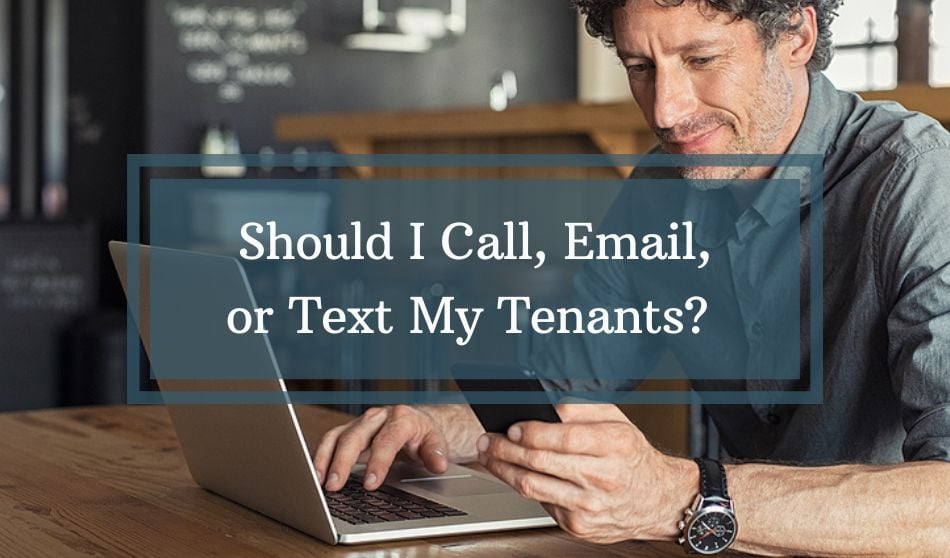
With advanced communications tools at our fingertips, connecting with tenants has never been easier. But with these advancements comes the complexity of regulations and user preferences which can make a landlord wonder which communication method is best.
There is a time and place for text messaging, email communication, and phone calls during a property manager’s day. But if you’ve ever questioned which would be best in a given situation or if you’ve never considered emailing or texting your tenants, this article can help you make that decision.
Each communication method serves a unique purpose for your rental business. This article will outline specific reasons to choose one way over another, give tips for optimizing that resource, and point you in the direction to learn more about regulations and best practices.
REASONS WHY YOU NEED TO CALL YOUR TENANTS
There will always be a need for a live conversation, such as receiving inbound inquiries and appointment scheduling. Even if you reach your tenant’s voicemail, you might want to prioritize outbound calling for:
Emergencies – Disaster recovery plans should always include protocols for contacting your tenants in as many formats as possible, which include phone calls.
Courtesy reminders – These quick and friendly calls may help eliminate unnecessary late notices or lease violations.
Seeking clarity or more information – Although convenient, emails and texts can be a bit impersonal and lack the dynamic that naturally allows for dialog that could produce details, cooperation, and clarity. It eliminates the back-and-forth or miscommunication on complex matters.
Best Practices For Calling Your Tenants
Picking up the phone has been the go-to for generations. But with that comes the inefficiencies of missed calls and voicemail phone-tag, leading to strained frustration on both sides.
It may go without saying, but phone etiquette and patience are the keys to best success with calling. Perception is that younger generations shy away from phone calls and must prefer email or text over voice calls. Valuable tips for getting your tenants comfortable with calls from their landlord are:
Be professional. State your name and purpose for your call upfront. Being too familiar, chatty, overtly friendly, or vague can not only be upsetting for your tenants but could also be misconstrued as passive-aggressive, harassing, or worse.
Leave a detailed voicemail. Simply saying, “Please call me back” without a clear purpose won’t increase the likelihood of a callback and will undoubtedly strain your tenant-landlord relationship. Professionalism is just as crucial for voicemail as a connected phone call because voicemail is a recording that could be admissible in court under certain circumstances.
Add a personal touch. Being personable is good customer service, whether it’s your friendly tone of voice, greeting, or salutation.
Only call during business hours. Unless there is a severe emergency, follow the FCC guidelines when calling current or prospective renters. On that same note, only call for business-related reasons, and be careful not to overstep as that might violate the warranty of privacy due to your tenants.
Are Phone Conversations Legally Binding?
As a leasing agent, calling up prospective tenants to let them know they’ve been accepted for a rental unit is welcome news. Does that constitute a verbal agreement? In some states, it might be legally binding. Check with your real estate board and state regulations to know what constitutes a legal contract.
Integrity calls for meaning what you say and saying what you mean, but in property management, follow up with documentation to back up your conversations. That could take the form of entering your call notes into the tenant note section of your property management software and sending your tenant a follow-up email.
REASONS WHY YOU NEED TO EMAIL YOUR TENANTS
Email is a convenient tool to help you share and communicate important information quickly.
With email, you can:
Share visual information — Infographics, pictures, and graphics are a great way to share information with your tenants, and email is a perfect platform for those resources.
Reminders – The best property management software automates tenant reminders to save you valuable time. Tenant invoices, due rent amounts, added charges, and overdue reminders can arrive in your tenant’s inbox without you needing to lift a finger.
Communicate important information quickly – from extensive renovation or maintenance projects to new policies or procedures; sending group messages will save you time getting the word out.
Store documentation. Email gives you a date and time-stamped record of the communication. In some landlord software, you can even copy and paste email replies into the tenant notes for safe keeping in case they are needed for documentation.
Best Practices For Emailing Your Tenants
Landlords should draft every email with professionalism and purpose:
- Random, incomplete, or incoherent emails will defeat your goal of better communication.
- If the email doesn’t have a clear business purpose, the email is spam.
- Be sure to have your contact information included in your email.
- Double-check that an attachment is included if you reference one.
- Schedule emails to arrive during business hours. Just because you might work evenings and weekends, your tenants shouldn’t be bothered with emails from you during those times.
Are Email Notifications Considered Legal Written Documentation?
In most cases, yes, email can be considered legal written documentation. However, it may not satisfy your state’s requirements for specific notifications such as move-out notices, lease violations, or evictions. Check with your real estate board or real estate attorney for clarification.
REASONS WHY YOU NEED TO TEXT YOUR TENANTS
- They’ll get the message. Text messages have a reported 99% open rate, and 94% are read within 5 minutes. Your tenants won’t be able to tell you they missed a call or the email went to spam.
- Universal. Even if your tenants don’t have a smartphone, they will still be able to receive your messages. Without a smartphone, emails are only accessed from a computer. For tenants on the go, texting your tenants will be more convenient.
- They’ll respond. Texting has become instantaneous and convenient for senders and receivers. The response rate associated with SMS is significant. According to Text Marketer, customers are 6-8 times more likely to take action from a text message than through email.
- You’ll Be Competitive. Positioning yourself as a tech-savvy manager who communicates with tenants through convenient messaging platforms will make you stand out from competitors who are not text-friendly.
Even though the research supports it, you might have some tenants who cannot or do not want to receive text messages. During the lease signing process, discuss with your tenants the communication options, find their preferred communication methods, and ask them if texting is okay.
How To Start Texting Your Tenants
- Get their permission first.
- Put it in writing. Your lease agreement or some other document should have a section indicating your tenant would like to receive text messages from you.
- Let them know what and how often you will text. Your tenants will appreciate knowing what type of information you will communicate via text message. Limit them to repair updates, rent due dates, or seasonal maintenance reminders. Every text you send them should have a purpose and be meaningful, so your tenant values and appreciates them.
- Provide guidelines for what a tenant can text you. Limit what information a tenant may text you. If you have a tenant portal for submitting maintenance requests, you should tell them they need to use the portal and not text you. Remind your tenants that essential issues, like late rent or lease termination, must be in writing and include a phone call, as stated in your lease agreement.
Many of the best property management software options deliver communication tools. Busy property managers and landlords will find convenient texting features in their property management software. You can schedule individual or group texts to your tenants to automatically generate and send whenever you want. You can create single-use messages or schedule the delivery of a message to coordinate with seasonal maintenance reminders or rent due dates. You can also automatically notify tenants when new charges are posted, payments are received, or if their account is late.
Are Text Notifications Considered Legal Written Documentation?
While some jurisdictions recognize text messages as a legal form of electronic communication, you will be better protected if you provide hard copies of essential items such as changing lease terms and rent increases. Texting your tenant best serves as simple reminders about seasonal maintenance or as a follow-up to an email or written notification.
Final Thoughts
Call, email, or text – which method is best for you and your tenants?
Consider the purpose, urgency, documentation, or regulatory requirements. Then consider the receiver. 75% of millennials think text messages are helpful for appointment and payment reminders. About the same percent of Gen Z favor text over email in purchase decisions (which could translate to invoicing and paying rent).
But public opinion and preferences are constantly changing. A current study shows some prefer an old-fashioned phone call over excessive use of email and texts. That means the best practice is to get to know your tenants and ask them which method they prefer. And be sure to check your property management software for easy-to-learn and easy-to-use built-in communication tools.





